-
By insisting Assad must go, the West has prolonged the Syrian conflict
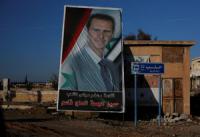
The most enthusiastic Western advocates of removing Assad form a liberal tendency and have been arguing for some form of intervention in Syria ever since the war began in earnest. They are opposed by more realist voices, who exhort them to remember the lessons of Iraq before getting militarily involved. Those on this side point to Syria’s fractured and often radical opposition, the regime’s formidable and battle-hardened forces, and the risks of starting a proxy conflict between the world’s great powers. In combination, these two tendencies have landed United States and United Kingdom foreign policy in an awkward gap between ends and means: Assad must go, but the military means required to remove him are off limits. It feels good to demand that a brutal dictator should no longer be allowed to rule, but insisting on it while failing to back it up with action has helped to prolong unimaginable suffering. Assad is clearly despicable, but the only atrocities worse than those his government has already committed are those yet to come. There are two ways to avert them: either Assad is deposed, probably via U.S.-led military intervention, or some political accord is struck to allow him to stay in exchange for a permanent ceasefire.
-
-
Islamist suspect arrested over Borussia Dortmund football club bus bombing

An Islamist suspect has been arrested by the German police, and a second one is being sought, over three explosions which yesterday rocked the team bus of Borussia Dortmund football club. The bus was hit while on its way to the Signal Iduna Park stadium for a European Championship League quarter-final game against the Monaco football club. The game is being played today, under heavy security.
-
-
Why do some with radical views become terrorists – but others do not?
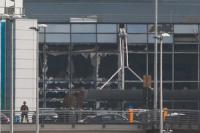
Since most people who hold radical views do not become terrorists, what are the factors that drive some to violent extremism? Is there a connection between mental illness and terrorist involvement? And why do some interrogators resort to torture when the body of evidence shows building rapport with suspects is more effective? These questions and others are addressed in a special issue of American Psychologist, the flagship journal of the American Psychological Association.
-
-
New training course on understanding, preventing radicalization, violent extremism
Practitioners and civic actors including law enforcement officers, school officials and community leaders can now, through a new self-paced, online training, gain a better understanding of radicalization to violence and violent extremism in the United States. Made available at no cost to learners, thanks to funding from the DHS, the course will also introduce a broad spectrum of community-led activities intended to foster resilience and counter violent extremism.
-
-
The Assad regime’s chemical-weapons kill chain
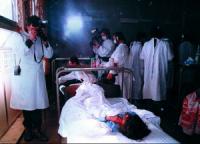
“There’s a long list of Syrian officials with blood on their hands — but the culpability goes all the way to the top,” Gregory Koblentz writes in one of the more important analyses of the Assad regime’s strategic use of chemical weapons (“Syria’s Chemical Weapons Kill Chain,” Foreign Policy, 7 April 2017). Koblentz, the author of Living Weapons: Biological Warfare and International Security, explains that the Syrian chain of command for chemical weapons is composed of four tiers: the senior leadership, which authorizes the use of these weapons and provides strategic guidance; the chemists, who produce, transport, and prepare the chemical weapons for use; the coordinators, who provide intelligence on targets and integrate chemical weapons with conventional military operations; and the triggermen, who deliver the weapons to their targets. “Together, these individuals and organizations form a chemical-weapons kill chain,” Koblentz writes.
-
-
Why can’t America just take out Assad?

As costly as Western inaction in Syria has been in the six years since the Arab Spring uprisings first took hold in Syria, recent history suggests that removing Assad in a hurry would be an even bigger mistake. Unlike in a game of chess, in war removing the king is not the end, but only another beginning. Targeting Assad would likely give birth to the same kind of catastrophe we saw in Libya after Muammar Gaddafi’s fall. In Libya, with no true civil governance to hold the structure together, tribal alliances collapsed and a four-way fight for power emerged. Assad shouldn’t remain in power – he’s been proving that for six years. The recent Sarin gas attack is only the most recent on a long list of other human rights violations. But he should be part of a political and legal process that removes him. That process must come from the Syrians themselves, not from the outside.
-
-
Bolstering security in urban centers
The terrorist attack in Stockholm on Friday mimicked previous attacks in Europe, in which terrorists used vehicles to kill civilians. Among the cities in which such attacks were carried out are London, Nice, Glasgow, Berlin, and more. More and more cities are considering the use of bollards to protect not only buildings – but other, “softer” urban areas. The Whole Building Design Guide (WBDG) program of the National Institute of Building Sciences offers a detailed Resource Page with useful analysis of and information about crash- and attack-resistant bollards.
-
-
U.S. strikes Syrian airbase from which Assad forces launched sarin gas attack
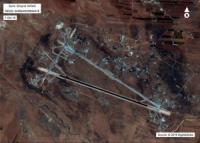
The United States has launched fifty-nine Tomahawk cruise missiles on a Syrian airfield from which Syrian military planes three days ago flew to carry out a sarin gas attack against Sunni civilians in the rebel-held Idlib province. More than eighty people, including thirteen children, were killed in the attack – and in a subsequent attack by the Syrian Air Force which destroyed the hospital to which many of the victims of the gas attack were taken. The cruise missiles were launched from the guided-missile destroyers USS Ross and Porter in the eastern Mediterranean. The United States has had military advisers and specialist on the ground in Syria for a while – it now has about 1,000 soldiers in Syria — advising the anti-regime rebels – especially the Syrian Kurds – but last night cruise missile attack marks the first time the United States has been involved as a combatant in the Syrian conflict.
-
-
Will the U.S. missile strike be the turning point in Syria’s shifting war?

The United States has struck the Syrian airbase used to launch a suspected sarin gas attack against Khan Sheikhun that killed more than eighty civilians. The rebel commander whose district was hit by the suspected chemical weapon attack has said he hopes the strike will be a “turning point” in the war — but the long-running conflict has had many such apparently pivotal moments. A shift of U.S. foreign policy on Syria could have been the game-changer. But the U.S. airstrike is more likely to reinforce the balance of power between the combating factions rather than lead to a turning point.
-
-
At least 58 killed in Syrian army’s chemical attack in rebel-held Idlib province
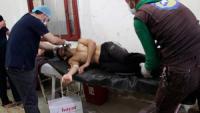
At least fifty-eight people were killed in a chemical attack the Syrian military launched by against a rebel-held Syrian town in Idlib province Tuesday morning. Medics rushed scores of injured civilians to a hospital – but the Syrian air force then bombed the hospital, reducing it to rubble. This is the third reported chemical attack in Syria in just over a week. The previous two were reported in Hama province, in an area not far from Khan Sheikhoun, the site of Tuesday’s attack.
-
-
At least nine killed in St. Petersburg metro bombing
At least nine people have been killed and about fifty more injured when a bomb exploded on a train in St. Petersburg. An explosive device went off at 2:20 p.m. local time on a train leaving the Technology Institute station and heading to the Sennaya Ploshchad station. All train travel in the St. Petersburg area has been suspended, and Russian security services found and defused another explosive device at the Ploschad Vosstaniya station.
-
-
U.K. airports, nuclear power stations on terror alert following “credible” threat
Airports and nuclear power stations in the United Kingdom have been instructed to bolster their defenses against terrorist attacks in the face of intensified threats to electronic security systems. Security services have issued a series of alerts over the weekend, warning that terrorists may have developed ways of bypassing safety checks. U.S. and British security services are concerned that terrorists will use the techniques they developed to bypass screening devices at European and U.S. airports, against other critical infrastructure facilities such as nuclear power stations.
-
-
The tragedy of Mosul: battle against Islamic State is leading to all-too-familiar consequences

A tragedy is unfolding in Mosul, the northern Iraqi city that Islamic State (IS) has brutally occupied since June 2014. The spike in civilian deaths – the result of an intensification of bombing by the international coalition during February and March — has been so dramatic, it has prompted speculation that the U.S. military has changed its rules of engagement. It has also sparked debate about whether deaths caused by the West are held to a different standard than those caused by countries like Russia. The impacts of Mosul’s brutal occupation and painful liberation are compounding Iraq’s seemingly endless list of social and economic problems. The tragedy of Mosul is that while IS’s territorial project in Iraq is coming to an end, it is creating new problems – destruction, displacement, trauma – that exacerbate the country’s existing challenges. The West must acknowledge its role in stoking this crisis, just as Russia and Iran have been responsible for suffering in Syria. Mosul, it seems, is the West’s Aleppo.
-
-
News exposure linked to greater anger toward Muslims: Study
New Zealanders — whether liberal or conservative — show both increased anger and reduced warmth towards Muslims if they are more avid news consumers, a new scientific study has found. “People tend to interpret the news in ways that fit with their pre-existing biases, seeking affirmation of their beliefs while discounting conflicting information,” says one researcher. “New Zealand is a good test for speculation about media-induced Muslim prejudice because of its overall highly tolerant people. If anything, tolerant Kiwis might tend to reject intolerant stereotypes, reducing the effect of the media.”
-
-
Carlos the Jackal sentenced to third life term for 1974 Paris attack
A French court found Carlos the Jackal – the Venezuelan-born Ilich Ramírez Sánchez, a leftist urban terrorist who carried out terrorist attacks in France in the 1970s and 1980s – guilty of killing two and injuring thirty-four in a 1974 grenade attack on a Paris drugstore. Sánchez, who is already serving two life sentences for a 1975 terrorist attack, was at one time one of the world’s most wanted criminals. Sometime in the mid-1980s he escaped to Khartoum, Sudan, and led a quiet life until 1994, when French special forces, in a daring commando raid, captured him and brought him back to France.
-
More headlines
The long view
Patriots’ Day: How Far-Right Groups Hijack History and Patriotic Symbols to Advance Their Cause, According to an Expert on Extremism
Extremist groups have attempted to change the meaning of freedom and liberty embedded in Patriots’ Day — a commemoration of the battles of Lexington and Concord – to serve their far-right rhetoric, recruitment, and radicalization. Understanding how patriotic symbols can be exploited offers important insights into how historical narratives may be manipulated, potentially leading to harmful consequences in American society.
Luigi Mangione and the Making of a ‘Terrorist’
Discretion is crucial to the American tradition of criminal law, Jacob Ware and Ania Zolyniak write, noting that “lawmakers enact broader statutes to empower prosecutors to pursue justice while entrusting that they will stay within the confines of their authority and screen out the inevitable “absurd” cases that may arise.” Discretion is also vital to maintaining the legitimacy of the legal system. In the prosecution’s case against Luigi Mangione, they charge, “That discretion was abused.”
“Tulsi Gabbard as US Intelligence Chief Would Undermine Efforts Against the Spread of Chemical and Biological Weapons”: Expert
The Senate, along party lines, last week confirmed Tulsi Gabbard as Director of National intelligence. One expert on biological and chemical weapons says that Gabbard’s “longstanding history of parroting Russian propaganda talking points, unfounded claims about Syria’s use of chemical weapons, and conspiracy theories all in efforts to undermine the quality of the community she now leads” make her confirmation a “national security malpractice.”
